Not What EU, but Whose Is the EU. That Was the Question in Bratislava
Adelina Marini, September 23, 2016
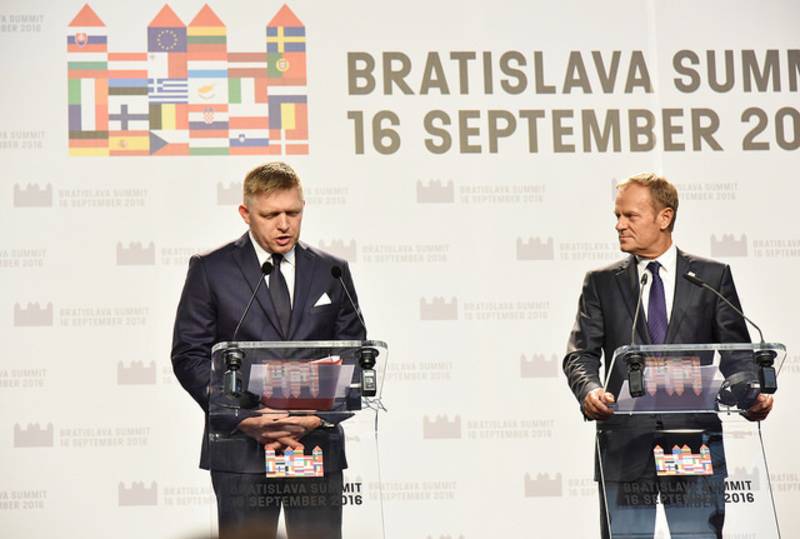 Never since its creation has the European Union had to prove why it is a peace project, whose aim is to prevent armed conflicts between states in Europe. Some member states last year hurried to send their armies to protect their borders, including internal ones for the Union and Schengen, put up wire fences and generated footage, which looked like it comes from an armed conflict. Rhetoric hardened, diplomatic tone was abandoned, threats and ultimatums are being sent out. One could only guess what could have happened if it were not for the EU. But the union exists, despite the words of European Commission boss Jean-Claude Juncker (Luxembourg, EPP) that there is neither enough Europe nor enough union in it, it is obvious that its main function – protecting the peace on the continent – works.
Never since its creation has the European Union had to prove why it is a peace project, whose aim is to prevent armed conflicts between states in Europe. Some member states last year hurried to send their armies to protect their borders, including internal ones for the Union and Schengen, put up wire fences and generated footage, which looked like it comes from an armed conflict. Rhetoric hardened, diplomatic tone was abandoned, threats and ultimatums are being sent out. One could only guess what could have happened if it were not for the EU. But the union exists, despite the words of European Commission boss Jean-Claude Juncker (Luxembourg, EPP) that there is neither enough Europe nor enough union in it, it is obvious that its main function – protecting the peace on the continent – works.
This is the sole achievement of the Bratislava summit, the purpose of which was launching a process of reconsideration of the EU. On the eve of the summit, however, the feeling hung that the Union is at a crossroads and a real one at that – member states disagree on both the direction and the mode of transportation as euinside reported. "Although one country has decided to leave, the EU remains indispensable for the rest of us. In the aftermath of the wars and deep divisions on our continent, the EU secured peace, democracy and enabled our countries to prosper. Many countries and regions outside still only strive for such achievements. We are determined to make a success of the EU with 27 Member States, building on this joint history", starts the Bratislava declaration.
The document confirms that the European Union remains and there will be no disintegration. In the words of the main host of the summit – Slovak PM Robert Fico – the EU is the best possible project for Europe. "Here we can't go into reverse, we must continue to move forward. Prosperity, stability and security in Europe otherwise cannot be guaranteed. It is only through the EU that this is possible", he said at a joint press conference with European Council President Donald Tusk (Poland EPP) and Jean-Claude Juncker (Luxembourg, EPP) of the European Commission.
What remained unsaid, however, is what the direction to take is. The text makes it clear that for now the EU will remain as it is – a guarantor of peace, democracy, security, the free movement of people, but it does not clarify how this is to be achieved. Neither is democracy blooming everywhere in the union, nor is security, and the free movement of people is more and more subject to interpretation. The apple of European discord remains migration policy and in looking for a compromise on this subject aiming to preserve the Union intact in the name of its main function (protecting the peace), there is huge risk that the EU will trample some of its values, despite having been stated in Bratislava that they will remain the guiding light to the 27. The EU being a peace project is actually the least common denominator around which all member states united. Division on the other subjects, as well as ideological division remain and will only deepen.
Flexible solidarity, but only when it is in our favour
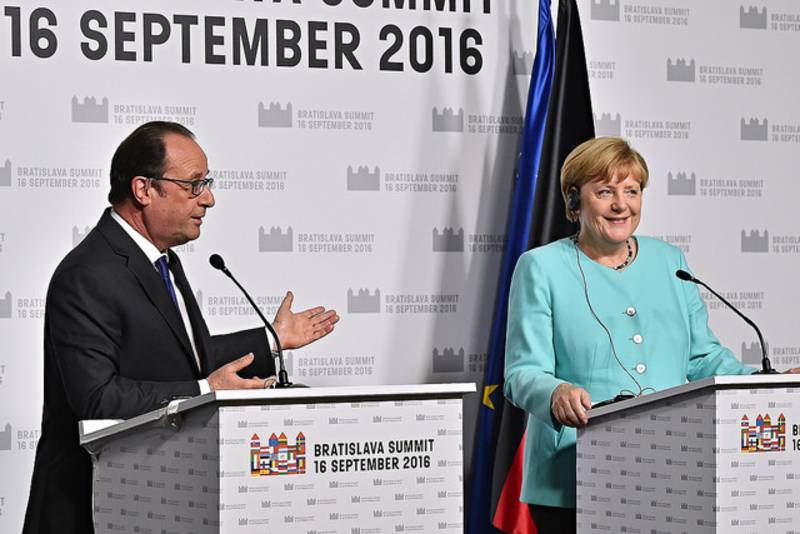 A week before the first anniversary since Hungary, backed by the others in V4, declared war to European solidarity (on September 22, 2015 the Council voted on the Commission proposal for quota-based relocation of refugees), the Visegrad paradox was born. The four Visegrad countries propose in their own vision for the EU that its migration policy is based on the flexible solidarity principle. "This concept should enable Member States to decide on specific forms of contribution taking into account their experience and potential. Furthermore any refugee distribution mechanism should be voluntary", says in the declaration of the V4. On the other hand, the Visegrad group is extremely rigid and unyielding regarding Great Britain and its request to leave the Union.
A week before the first anniversary since Hungary, backed by the others in V4, declared war to European solidarity (on September 22, 2015 the Council voted on the Commission proposal for quota-based relocation of refugees), the Visegrad paradox was born. The four Visegrad countries propose in their own vision for the EU that its migration policy is based on the flexible solidarity principle. "This concept should enable Member States to decide on specific forms of contribution taking into account their experience and potential. Furthermore any refugee distribution mechanism should be voluntary", says in the declaration of the V4. On the other hand, the Visegrad group is extremely rigid and unyielding regarding Great Britain and its request to leave the Union.
"Further objective - we would reject cherry-picking. You cant just sort of pick out all of the best items and have just what suits you", affirmed Slovak PM Robert Fico after the summit. Angela Merkel believes that the V4 declaration on flexible solidarity is a positive proposal. "Europe is always dependent on finding compromises", she said. "We've all seen in the past a majority of decisions on such sensitive issues will be met with a lot of resistance in some countries, so will have to try other means to come to a solution", added the German Chancellor.
Renzi again sees no sense in the EU, so does Orbán
This view on refugees at the two poles of the European Union at the moment - Orbán and Merkel – enraged Italian PM Matteo Renzi, who left the summit without paying any attention to journalists. There was talk in Bratislava that the initial plan was for Renzi to stand alongside Merkel and Hollande, but he later refused after expressing his disappointment with the summit. Not only did he refuse to stand along with them, but the Italian PM did not give a briefing at all, which is rare. He always talks to journalists after the end of every EU summit. The rage of Mr Renzi reminded of his first outburst, back when the migrant problem had still not turned into an EU-wide crisis but was still a local issue, mainly for the frontline countries of Italy and Greece.
What is curious is that Hungarian PM Viktor Orbán too was not happy with the outcome of the summit. According to a press release on the Hungarian government website, the Hungarian PM stated at a press conference that "we failed to change the EU’s immigration policy". Despite the apparent unity of V4, Mr Orbán differed from the assessment of the host Fico, according to whom the summit was extremely successful. Viktor Orbán is of the exact opposite opinion. The summit was unsuccessful, for the previous "self-destructive and naive" migration policy continues to dominate in the EU, he said. In his opinion, the V4 were the only ones at this summit to came up with specific proposals for the EU.
The most important question for Hungary was will others follow Great Britain in leaving the EU and whether the Union will continue down the road of disintegration. No one else wished to leave the Union and so everyone decided they should stand together, the press release says. Facing journalists, Mr Orbán did shed some light on the controversy of Hungary demanding a looser union but supports the creation of an European army as well. His main idea is having this army perform operations in migrant camps outside the EU. His words also clear up his concept of European solidarity. In his opinion, it is oversimplified to say that those who harbour refugees demonstrate solidarity, while those 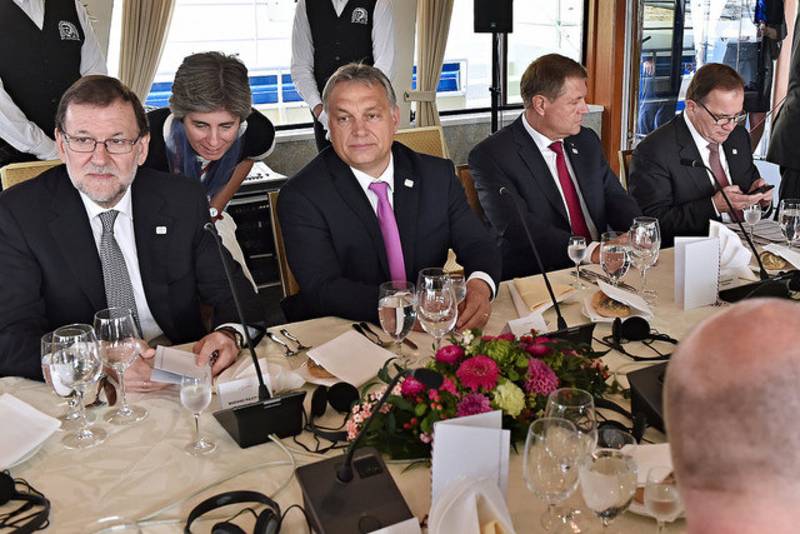 who refuse – do not. To him a show of solidarity is when states "sacrifice" themselves in the name of European safety and security by spending money on border protection.
who refuse – do not. To him a show of solidarity is when states "sacrifice" themselves in the name of European safety and security by spending money on border protection.
He stressed that Hungary is among countries that demonstrate the most solidarity, for were it not for the Hungarian border protection, other countries would have been in a lot of trouble. "In an act of solidarity, Hungary is itself bearing all the costs associated with protecting not only itself, but also Europe’s other nations", stated the Hungarian PM.
Everyone loves Boyko
His Bulgarian colleague Boyko Borissov, whom Orbán met in Sofia a day before the summit, has the exact opposite view on solidarity. It was somewhat surprising that Bulgaria emerged at the focal point of the summit, having no leader skip announcing publicly, during the meeting or in talks before it, that Bulgaria needs to be helped in protecting its border with Turkey. 108 million euro were allocated to Bulgaria for equipment and financing of 200 more Frontex border policemen. According to Mr Borissov, it is not that Bulgaria is unable to meet rising costs, but in this case it was important to him that European solidarity with Bulgaria is demonstrated.
"We have 13 billion in the fiscal reserve. We have the money to pay, but it would not be fair if the country makes so much effort and it is not recognised when as common European solidarity ... I do not recall at all, you know, that Bulgaria was ever singled out, with a separate decision and that anything targeted was done just for Bulgaria", said the Bulgarian Prime Minister in a kind of a monologue after the summit. During Viktor Orbán’s visit, Borissov stated that the EU must immediately give money, because the Bulgarian budget was unable to take the pressure of paying compensations to American power plants and Russia for the never built nuclear power plant in Belene. This poses the question of how far do Mr Borissov’s views on European solidarity reach and should the EU pay for the energy decisions of several governments in a row.
Whose EU is it?
The hidden question at the summit was not what, but whose Union is it – does it belong to the founders France and Germany, to Orbán, or the institutions? Everyone pulled the rug in their direction and marked their territory in the Union. The leaders of France and Germany attempted to remain the main engine of the EU, standing together at a joint press conference after the summit. This is no precedent, but ever since François Hollande is president it is definitely a rare occasion. "I do understand that Mr Orbán doesn’t have the same approach and that will remain the case. It was important to show that France and Germany are really together in order for the EU of 27 to succeed. This is the reason why the chancellor and myself wanted to stand together to present the conclusions", explained Mr Hollande. "We feel responsible for turning this agenda into a success story and not only leave it as empty words on paper", added Mrs Merkel.
Lithuanian President Dalia Grybauskaitė said that it was important that Angela Merkel be strong and clearly stated her support in this difficult moment for her, both in terms of internal politics in her party and in Germany, and on a European level as well. Bulgarian Prime Minister Boyko Borissov took no side in the argument over the ownership of the Union, but stated that there is no better place to live than Europe. He asked what the model was that the EU wants to follow, but in his eyes the alternative is external, not internal (the Orbán one for example). "What is the model we wish to follow – the Turkish, the Russian, the American one?". It became clear from his words that he only sees the EU as a means of financing the economic convergence between member states.
The vision of France and Germany has always been one for deeper integration, although they do have their differences regarding the stages and the speed. The Visegrad Four, however, (Slovakia, The Czech Republic, Poland, and Hungary) have a different vision for the EU. In their declaration, they point out that the institutional balance in the EU needs to be reinstated with the main responsibility for pointing at the right direction should fall with the European Council. Secondly, the four states want a strengthening of the role of national parliaments. V4 is against the possibility for some member states to get tighter integration, abandoning the rest. "It is necessary to work out a solution that will enable all countries to feel comfortable in the EU. For this reason, the Visegrad Countries insist that the European integration is a common project and all negotiations should therefore be inclusive and open to all Member States", says in the declaration. This is a clear call for future blocking of the appetites for deepening of integration, despite having options for different stages of integration clearly spelt out in the Treaty of Lisbon.
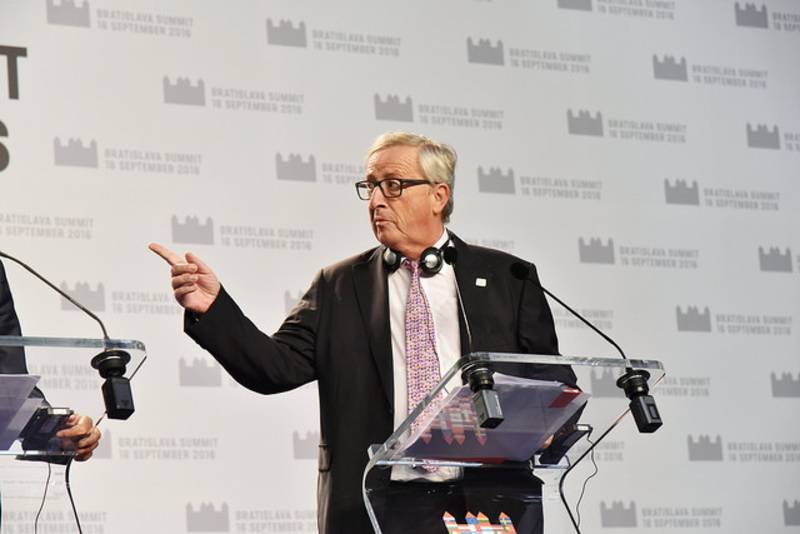 The battle for ownership over direction-setting was joined by EC boss Jean-Claude Juncker, who began his introductory words of the final press conference with a statement of satisfaction with the warm welcome the leaders had for his annual address in the European Parliament. It is true that it was for the first time and completely unusual that leaders publicly praised his address, which poses the question whether they liked the direction he drafted, or his analysis of the state of the Union. The German Chancellor liked the priorities. "I think Jean-Claude Juncker in his speech did put the right priorities". There is no doubt that the reason is that this is the least ambitious speech on the state of the Union since this format exists, introduced by Juncker’s predecessor José Manuel Barroso.
The battle for ownership over direction-setting was joined by EC boss Jean-Claude Juncker, who began his introductory words of the final press conference with a statement of satisfaction with the warm welcome the leaders had for his annual address in the European Parliament. It is true that it was for the first time and completely unusual that leaders publicly praised his address, which poses the question whether they liked the direction he drafted, or his analysis of the state of the Union. The German Chancellor liked the priorities. "I think Jean-Claude Juncker in his speech did put the right priorities". There is no doubt that the reason is that this is the least ambitious speech on the state of the Union since this format exists, introduced by Juncker’s predecessor José Manuel Barroso.
Juncker was delighted that even Donald Tusk liked his speech. "You're familiar of course with the language used at press conferences and you will have noticed Mr Tusk is usually very restrained, and he went as far as saying the European Council welcomed the Commission president's speech. Usually, we have to fight to get the Council just to take note on what the Commission does", he said triumphantly.
Like members, like Union
Another argument in favour of the unity of the Bratislava declaration being hollow was the press conference of European Parliament President Martin Schulz (Socialists and Democrats, Germany), who was not invited at the summit, as is traditional for official summits in the EU. He was outraged by the fact and decided to have his say in front of media. In his opinion, the EU is only as strong as member states allow it to be. "European institutions are part of that Union, they are instruments of that Union, but the Union itself is created by the member states. It's not the EU in Brussels which has founded the Federal Republic of Germany, or invented Italy, or created France or Slovakia. It is the other way around. The member states built the Union and they have to take responsibility for the Union they have created", began Mr Schulz.
He also offered his analysis of the state of the EU, explaining it is built on two pillars – cooperation between sovereign states, which is really intergovernmental cooperation, and between states, which have transferred sovereignty to a supra-national level with separate bodies. The second one, in his words, is European integration. Over the last few years, the two pillars are in conflict. Martin Schulz spoke slowly and considered every word regarding Orbán’s vision for the EU. The two of them had a conflict after the Hungarian PM urged for more respect from the boss of the EP. The two met before the summit and according to Schulz, Orbán is a representative of "a completely different view than my own view". Schulz described the meeting as very confrontational and open, but also fruitful.
He is of the opinion that the ideological line of Kaczyński-Orbán will have strong influence on the EU. "I disagree entirely with this re-nationalisation strategy which is in my eyes a way to give answers to the challenges of the 21st century with a proposal of the 19th". This is wrong, but it exists and that means we need to discuss it. Schulz warned that nobody should claim to be the only one to represent the people. "I represent the people as well", he said on account of Orbán’s everlasting claims that he speaks on behalf of the people. There was disappointment leaking from his lengthy replies, but also resignation that there is now officially a new ideological line in the EU, which is in total conflict with the European system of values.
Lost in translation, or hurrying too much?
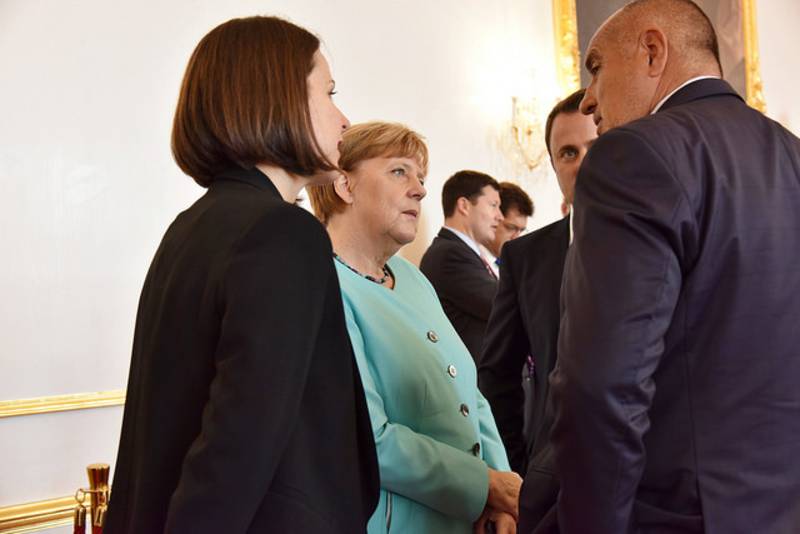
The statements of individual leaders not only demonstrated that the claim in the Bratislava declaration of European unity is hollow and lacking substance, but there was also a case of lost in translation on the character of the summit. In his introductory remarks at the press conference of the evening of September 16 Mr Juncker decided to correct host Robert Fico, who stated that the EU summit was successful. According to Juncker, this was not an informal European Council (a summit of the leaders of member states, which does not produce written conclusions), but an informal meeting of 27 member states. "This is a premier in the history of the EU and that’s why we're not publishing written conclusions because that would have not been appropriate", said Juncker.
"As to the format of the summit it was an informal meeting of the 27 heads of state and government", replied Robert Fico. "We are in Bratislava as the 27 only for an informal meeting because the EU is still in 28 format", specified the European Council boss Donald Tusk. It never became clear whether the need for these clarifications came from a case of lost in translation, or whether some leaders already see the Union as having 27 members. Tusk explained that the 27 format will be institutionalised the moment Great Britain triggers Article 50 of the Treaty for the EU, which is not likely to happen by the end of the year, he said, but reminded that the EU is prepared to start negotiations tomorrow if needed.
Soft or hard Brexit?
Judging by the reaction of the Slovak PM on the Brexit subject, it is very possible that this is no case of lost in translation. A journalist’s question regarding the access of the United Kingdom to the EU’s common market and the freedom of movement of people or just workers precipitated the development of a curious scene. After Donald Tusk answered the question, his spokesperson began announcing who the next journalist is to ask a question. At this moment, however, he was interrupted by Jean-Claude Juncker with the words: "No, no, no - this is a question for Robert and for me, and as we are in Slovakia Robert has the floor". The Slovak PM stated that negotiations with Great Britain should not be detrimental to European interests. Right at that point he made his statement about cherry-picking and how important it is the outcome of the negotiations to be that it is better to be in the EU than outside it.
This thesis is incredibly fitting to Mr Juncker, who rejoiced after the Great Britain referendum and was accused of being too sharp against the Kingdom, and there were even calls for his resignation because of that. When he started speaking, the former Luxembourg PM added that there is a clear connection between access to the internal market and the freedom of movement of people. "I can’t see any possibility of compromising on that very issue", said Mr Juncker. The Slovak PM added that at the moment there are approximately 70 000 Slovaks living in the UK, and adding countries like Bulgaria, Romania, and especially Poland, he said, the numbers grow tremendously. "The negotiations have to be about the mutual relations between the UK and the member states in future, and you can’t get away from the feeling that such negotiations run the risk of creating a second rate citizens in the UK and that's going to be a crucial point for us in the negotiations. We cannot let the result of the Brexit be that those who have contributed considerably to the British economy become second rate citizens", stressed Mr Fico.
Let the anniversary pass
The statements of many leaders created the feeling that an agreement was reached to attempt demonstrating European unity until March of 2017, when there will be a celebration in Rome for the 60th anniversary of the signing of the Treaty of Rome, which lays the foundations of the EU. Until then, the Bratislava process must be completed. It is expected to become clear in Rome not only whose, but also what the European Union will be in the future. Whether in the name of keeping the peace on the continent it will do several steps back in order to satisfy Viktor Orbán (and the rest of the V4)’s demands, or will it throw the ballast overboard and float up to surface, capable of setting the direction and following it without having quarrels about who is at the rudder, is  a question that is difficult to answer at the moment. More so for there is a counter-current expected to be formed by elections next year in the EU’s twin engine – France and Germany.
a question that is difficult to answer at the moment. More so for there is a counter-current expected to be formed by elections next year in the EU’s twin engine – France and Germany.
An essential part of the roadmap, agreed on September 16, is the commitment to follow ... commitments. It was agreed that the mechanism for the review of implementation of decisions made will be reinforced and a commitment is made for "loyal co-operation and communication of Member States". Mr Orbán’s press conference shows that this will be the most difficult part. The conclusion of Bratislava is that the European Titanic is already headed for the iceberg. Some have noticed it and call for a change of course, others prefer that the band keeps playing. The estimated time of impact is March of next year.
Translated by Stanimir Stoev
 Federica Mogherini | © Council of the EU
Federica Mogherini | © Council of the EU | © Council of the EU
| © Council of the EU Luis De Guindos | © Council of the EU
Luis De Guindos | © Council of the EU